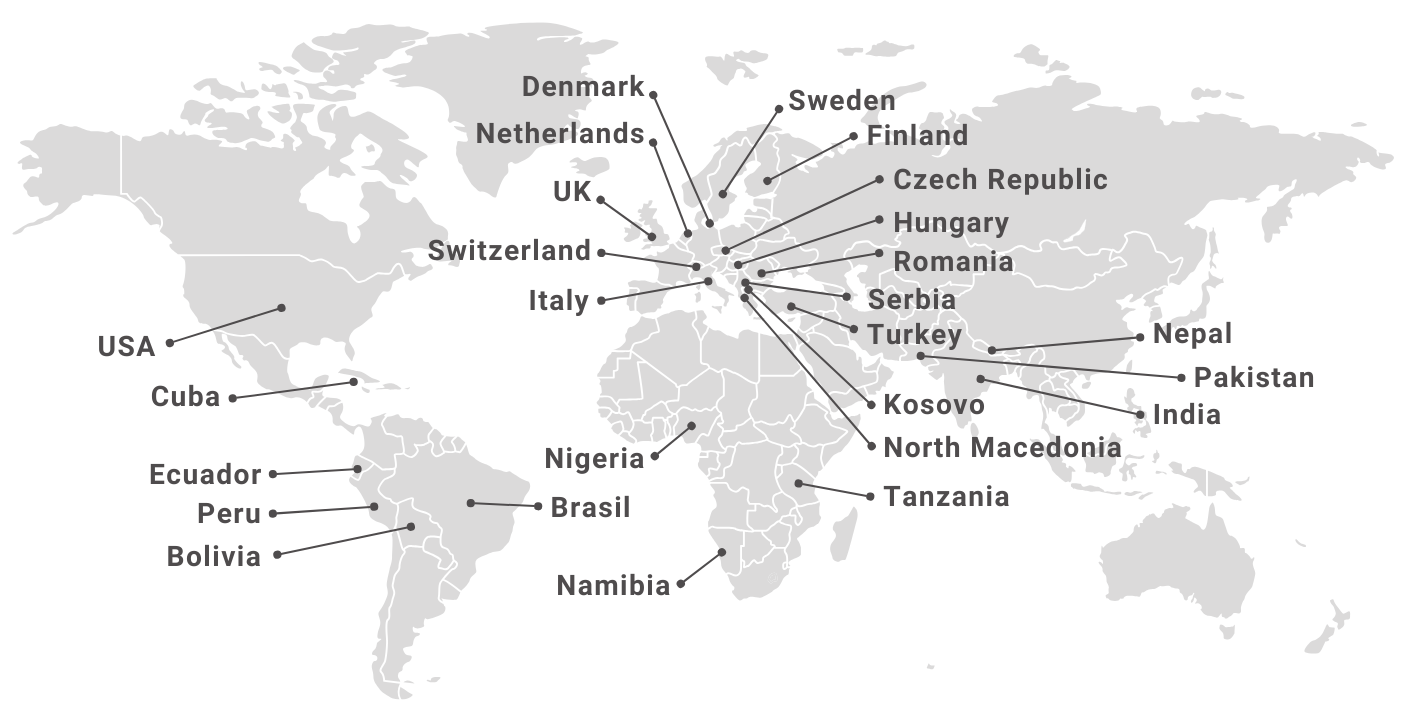PatientAdvocacy.Academy 2025 Spring Edition
Building a strong patient organization
A credible organization led by true representatives of the rare disease community is key to effective advocacy. A well-structured association or foundation improves patient care and access to life-saving therapies. Beyond advocacy, leaders need skills in fundraising, strategic planning, and HR management. This edition of PatientAdvocacy.Academy equipped participants with tools to build a strong organization, manage budgets, and engage volunteers. We also provided insights into public policy advocacy, focusing on treatment access and stakeholder relations.
A record-breaking edition of the Academy
In this edition, we gathered a record number of 30 participants from 5 continents, representing 11 rare diseases. It was an incredible opportunity for global collaboration and learning!

Let's take a closer look at key elements of the Academy
We have prepared a 21-day program with a wide range of activities to maximize benefits while allowing participants to balance their involvement with daily responsibilities and professional work.
1. PREPARING FOR THE JOURNEY: Initial Meetings
After selecting the Academy participants, we held short video calls with each of them. We discussed their organizations' current challenges, the situation of rare disease patients in their countries, and their goals for joining this edition. Many shared their desire to grow as leaders, connect internationally, and gain practical advocacy and fundraising tools.
2. ENGAGING THE GROUP: Building Community
The first four days of the Academy focused on building connections within the group. Participants introduced themselves in the private discussion group, sharing the story of their organization and the rare conditions they represent. What stood out was the genuine interest and engagement – attendees actively commented on each other’s posts, asked questions, and expressed support.
3. CORE KNOWLEDGE: Video Lectures by Experts
The course consisted of 10 video lectures, each about 15–20 minutes long, covering essential topics for building and managing patient organizations. These included establishing credibility, planning budgets, fundraising, effective advocacy, volunteer management, legal tools for patient rights, and developing long-term leadership. All lessons were delivered in English with subtitles to ensure accessibility. Each video was accompanied by supplementary materials such as charts, infographics, and real-life examples to help participants apply the concepts in practice.

4. KNOWLEDGE APPLICATION: Educational Content
Each video lecture came with quizzes and printable PDF exercises, helping participants apply lessons to their own organizations. Tasks included calculating core costs, drafting patient surveys, researching relevant clinical trials, and writing thank-you emails to volunteers.
5. COLLABORATIVE LEARNING: Online discussion circles
This year, we held four live online discussion circles, dividing participants into two groups based on time zones – spanning up to 11 hours. Each group met twice for two-hour sessions. The first focused on key challenges in their countries; the second on developing practical solutions. Participants were highly engaged, sharing insights and offering solutions to each other's issues.
6. SHARING KNOWLEDGE: Discussion Group
A key principle of the Academy was peer learning. A private discussion group allowed participants to share ideas, success stories, and resources. Lively discussions focused on challenges like volunteer engagement, budgeting, and building credibility, with both trainers and participants contributing examples and insights.
Leadership skills development
To evaluate the impact of the training, we carried out surveys before and after the course. The results revealed clear growth across all skill areas, with improvements ranging from 35% to an impressive 105%. The average increase in self-assessment across all skills was 58%.

How participants rated this edition of the PatientAdvocacy.Academy
We conducted a survey among participants after the end of the Academy to hear about their experiences and how they evaluate various aspects of this year's edition. Once again the participants rated PatientAdcocacy.Academy very highly. And all respondents expressed interest in attending future courses. A solid 86% answered “Definitely yes,” while the remaining 14% chose “Rather yes.”

“The videos were incredibly educational, and I found Adrian's experiences and the tips he shared during the online video circles especially insightful and impactful. Additionally, I really enjoyed the interaction with fellow participants in the Facebook group; it was inspiring and motivating to connect with others. I would be more than happy to join a future edition of the Patient Advocacy Academy, as the experience has been truly special.”
Maria Beekman-Kortekaas, HAE the Netherlands
“...I would like to thank you all again for the very insightful last few weeks. I have gained so much knowledge on how to manage our MG Myasthenia Gravis Foundation Namibia (...) and how we can bring about change to assist those with MG in the country.”
Corachia Ockhuizen, Myasthenia Gravis Foundation Namibia
If you want to learn more about PatientAdvocacy.Academy 2025: Rare Leaders, please click here to check our report in the PDF file.
